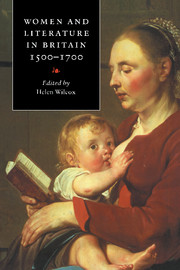Book contents
- Frontmatter
- Contents
- List of contributors
- Acknowledgements
- A note on references
- Chronology: women and literature in Britain, 1500–1700
- Introduction
- Part I CONSTRUCTING WOMEN IN EARLY MODERN BRITAIN
- Part II WRITING WOMEN IN EARLY MODERN BRITAIN
- Chapter 7 Renaissance concepts of the ‘woman writer’
- Chapter 8 Courtly writing by women
- Chapter 9 Women's poetry in early modern Britain
- Chapter 10 Women's writing and the self
- Chapter 11 The possibilities of prose
- Chapter 12 The first female dramatists
- Further reading
- Index
Chapter 9 - Women's poetry in early modern Britain
Published online by Cambridge University Press: 22 September 2009
- Frontmatter
- Contents
- List of contributors
- Acknowledgements
- A note on references
- Chronology: women and literature in Britain, 1500–1700
- Introduction
- Part I CONSTRUCTING WOMEN IN EARLY MODERN BRITAIN
- Part II WRITING WOMEN IN EARLY MODERN BRITAIN
- Chapter 7 Renaissance concepts of the ‘woman writer’
- Chapter 8 Courtly writing by women
- Chapter 9 Women's poetry in early modern Britain
- Chapter 10 Women's writing and the self
- Chapter 11 The possibilities of prose
- Chapter 12 The first female dramatists
- Further reading
- Index
Summary
This chapter takes as its starting point the inspirational work of two brilliant twentieth-century women. In A Room of One's Own (1929), Virginia Woolf writes the story of Judith Shakespeare, William's imaginary sister. Judith's story demonstrates the social and economic forces that prevented early modern women, even women of genius such as the imaginary Judith, from writing plays for London's public stage. Recent scholarship confirms Woolf's assertion that ‘it would have been impossible, completely and entirely, for any woman to have written the plays of Shakespeare in the age of Shakespeare’, but we now know that even though literacy rates were considerably lower for early modern British women than for men, there were in Shakespeare's England enough women who did read (or who heard books read aloud to them) to create a market for books addressed specifically to them (see chapter 4 of this volume). And in Shakespeare's England there were also women who wrote, if not Shakespeare's plays, then other literary works: closet dramas, autobiographies and biographies, journals and diaries, mothers' advice books, tracts defending women's virtue, almanacks, prose fiction – and poetry. Woolf, we now know, was not correct when she wrote of the Elizabethan period, ‘it is a perennial puzzle why no woman wrote a word of that extraordinary literature when every other man, it seemed, was capable of song or sonnet’.
- Type
- Chapter
- Information
- Women and Literature in Britain, 1500–1700 , pp. 190 - 208Publisher: Cambridge University PressPrint publication year: 1996
- 2
- Cited by



